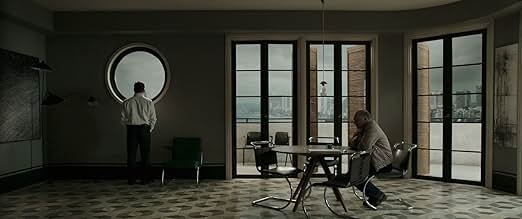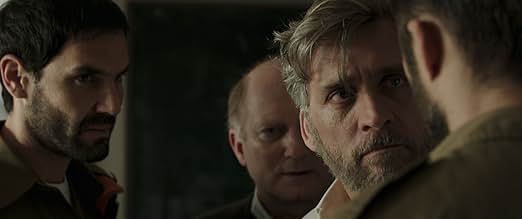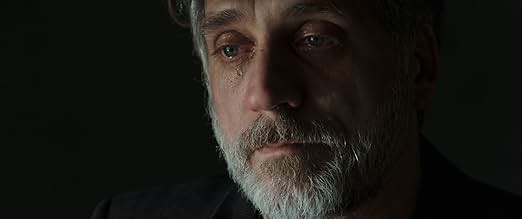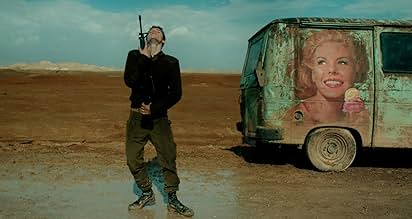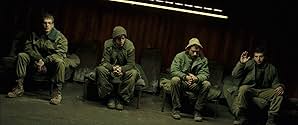IMDb-BEWERTUNG
7,2/10
8167
IHRE BEWERTUNG
Eine unruhige Familie muss sich den Tatsachen stellen, wenn etwas an dem trostlosen Militärposten ihres Sohnes schrecklich schief geht.Eine unruhige Familie muss sich den Tatsachen stellen, wenn etwas an dem trostlosen Militärposten ihres Sohnes schrecklich schief geht.Eine unruhige Familie muss sich den Tatsachen stellen, wenn etwas an dem trostlosen Militärposten ihres Sohnes schrecklich schief geht.
- Auszeichnungen
- 21 Gewinne & 25 Nominierungen insgesamt
Yonatan Shiray
- Jonathan
- (as Yonathan Shiray)
Itay Exlroad
- Dancer Soldier
- (as Etay Axelroad)
Arie Tcherner
- High Ranking Officer
- (as Aryeh Cherner)
Handlung
WUSSTEST DU SCHON:
- WissenswertesAccording to Samuel Maoz, the film was conceived as three episodes: The first sequence should shock and shake, the second should hypnotize, and the third should be moving.
- VerbindungenReferences Falsches Spiel mit Roger Rabbit (1988)
- SoundtracksNever Been
Performed by Betzefer
Ausgewählte Rezension
Part satirical allegory, part surrealist indictment, Foxtrot finds writer/director Samuel Maoz working with similar themes as he did in Lebanon - Tödliche Mission (2009); the ridiculous nature of war, the desensitisation of youth during wartime, the futility and meaninglessness of giving one's life in the service of one's country. However, whereas Lebanon was set during the 1982 Lebanon War, and shot entirely from inside a Centurion tank, Foxtrot is set in the present day, and expands Moaz's thematic concerns to take in the grief and anguish of those who have lost children to military service. Much like Lebanon, Foxtrot is an intensely political film, and much like Lebanon, Foxtrot has met with controversy and condemnation in Maoz's native Israel. Whereas Lebanon was accused of attempting to dissuade young men from joining the Israel Defense Forces (IDF), Foxtrot has been attacked for slandering the moral character of the IDF. A meditative and contemplative piece, heavy on metaphors, for the most part, the film hinges on non-action and passivity - the characters don't so much drive events, as events happen to them. Indeed, this is another of the film's themes - our inability to control fate (or, depending on your outlook, random chance). As with Lebanon, Maoz displays extraordinary technical proficiency and control of the medium, with the film as aesthetically impressive as it is politically divisive. A savage condemnation of both a national psyche and a military mindset that trades on the most binary of them-versus-us dichotomies and consciously strives to blur the line between personal honour and political ideology, Foxtrot is not always an easy watch, and it's rarely what you would call "entertaining", but it's undeniably a brilliantly made and deeply passionate film.
Divided into three distinct sections, the film tells the story of Michael Feldman (a superb Lior Ashkenazi), who receives word that his son Jonathan, a conscript in the IDF, has been killed "in the line of duty". Devastated, he begins to ask questions - how was Jonathan killed, where was he stationed, is there a body - none of which are met with a straight answer. However, several hours later, Michael and his wife Dafna (Sarah Adler) are told Jonathan is still alive; a Jonathan Feldman was killed, but it was a different Jonathan Feldman. The film then jumps several days back to a forlorn desert checkpoint on Israel's northern border (codename Foxtrot) manned by a group of wet-behind-the-ears soldiers, including Jonathan Feldman (Yonatan Shiray). The most action the group see is raising the barrier to let a camel amble through and checking the IDs of the few Palestinians who pass by. Indeed, they are more interested in the fact that the shipping container in which they sleep is slowly sinking into the sand than in anything military-related. However, when a mistake whilst checking the IDs of a group of Palestinians leads to tragedy, Jonathan comes to learn just how ruthlessly political the IDF can be. Without spoiling anything, the third section, which is kind of an extended coda, then returns to Michael and Dafna's apartment, six months after the opening scenes.
In Foxtrot, Maoz constructs an allegory through which he deconstructs Israeli national myths and self-aggrandising narratives. Interrogating what he sees as a culture of denial born from a reluctance to deal with the morality and sustainability of being an occupying force, the film gets a lot of mileage out of the metaphor of the foxtrot - a dance where no matter where you go, if you follow the steps correctly, you end up back at the starting position. Applied to Israel, or indeed, any nation, Maoz is suggesting that without taking great care, countries will repeat the errors of the past, ending up exactly where they once were. The film depicts three generations of Feldmans (Michael's mother (Karin Ugowski), a Holocaust survivor now suffering from dementia, Michael himself, and Jonathan) dancing the foxtrot (literally in Michael and his mother's cases), either unwilling or unable to face up to the country's violent and traumatic past. Speaking to the Globe and Mail, Maoz explains, "Foxtrot deals with the open wound or bleeding soul of Israeli society. We dance the foxtrot; each generation tries to dance it differently but we all end up at the same starting point", whilst he tells the LA Times, "the roadblock is a microcosm of a society - any society - that has its perception distorted by a past trauma."
In a more concrete sense, in two scenes at Foxtrot, the film examines the casual sadism, unspoken racism, and braggadocious machoism that can arise from serving in the armed forces of a country perpetually at war. In the first (arguably the best scene in the film), the soldiers make a Palestinian couple stand in the pouring rain whilst their antiquated computer checks the couple's IDs. Obviously dressed for a formal night (he is in a tuxedo, she in an elegant dress), by the time the soldiers clear them to pass, their clothes are destroyed, as is her hair, and her makeup is ruined, with the soldiers even making her empty the contents of her purse onto the ground. The scene is brilliantly staged, agonisingly realistic, and takes place in real-time, with Maoz concentrating on the couple looking at one another across the roof of the car, conveying agonised helplessness, compromised innocence, understandable belligerency, and, most saliently, abject humiliation. It's a masterclass in dialogue-free storytelling, and deeply political storytelling at that. In the second scene, the soldiers act with violent impunity against a car of young Palestinians, although the act of violence itself arises from a mistake.
Aesthetically, as with Lebanon, Foxtrot is fascinatingly staged. For starters, Maoz shoots each of the three sections differently, but in ways tightly tied to their thematic focus; the first is highly restrictive, trapping us in the confined ideological headspace of the Feldmans, with the intense emotionality constantly threatening to boil over; the vast wide-open vistas of the second part contrast sharply with the confinement of the first, with the entire section threaded through with surrealism and even a hint of magic realism; the third section is darker than the others (in a literal sense), with a stark visual design that emphasises only those elements that are important to the scene. The Feldman apartment itself is extremely angular, and although it's very spacious, cinematographer Giora Bejach shoots it in such a way as to appear oppressively box-like. Indeed, boxes are emphasised throughout the film; the floor pattern of the Feldman living room, the container in which the soldiers at Foxtrot sleep, the dance moves of the foxtrot itself. The impression given is that the characters are fundamentally trapped - in a practical sense by the boxes with which they've surrounded themselves, and in a more metaphorical sense by the nation's psyche.
Foxtrot certainly won't be for everyone. Some will take issue with the pacing (which, it has to be said, is extremely languid), some with the allegorical nature of the story, some with the film's politics. For everyone else, however, this is a brilliantly realised family tragedy, dealing with the randomness of pain and loss in a country refusing to recognise its past. Maoz tells a personal story, but he also exposes the nature of a country whose moral crisis is no less severe than the crisis in which the Feldmans find themselves. Critiquing the practice of sending soldiers to die for absolutely nothing, as well as the xenophobic mindset that has crept into the Israeli zeitgeist, Maoz has been accused of making an "anti-Israel narrative." On the contrary, he is pleading with his country to change its ways, or it will repeat the errors of history; this is the act of a man who loves his country deeply, but who can see its flaws. In one of the most devastatingly heartbreaking lines I've heard in a long time, Dafna muses, "I remember thinking that I was going to be happy." Maoz is suggesting so too did the Israeli people.
Divided into three distinct sections, the film tells the story of Michael Feldman (a superb Lior Ashkenazi), who receives word that his son Jonathan, a conscript in the IDF, has been killed "in the line of duty". Devastated, he begins to ask questions - how was Jonathan killed, where was he stationed, is there a body - none of which are met with a straight answer. However, several hours later, Michael and his wife Dafna (Sarah Adler) are told Jonathan is still alive; a Jonathan Feldman was killed, but it was a different Jonathan Feldman. The film then jumps several days back to a forlorn desert checkpoint on Israel's northern border (codename Foxtrot) manned by a group of wet-behind-the-ears soldiers, including Jonathan Feldman (Yonatan Shiray). The most action the group see is raising the barrier to let a camel amble through and checking the IDs of the few Palestinians who pass by. Indeed, they are more interested in the fact that the shipping container in which they sleep is slowly sinking into the sand than in anything military-related. However, when a mistake whilst checking the IDs of a group of Palestinians leads to tragedy, Jonathan comes to learn just how ruthlessly political the IDF can be. Without spoiling anything, the third section, which is kind of an extended coda, then returns to Michael and Dafna's apartment, six months after the opening scenes.
In Foxtrot, Maoz constructs an allegory through which he deconstructs Israeli national myths and self-aggrandising narratives. Interrogating what he sees as a culture of denial born from a reluctance to deal with the morality and sustainability of being an occupying force, the film gets a lot of mileage out of the metaphor of the foxtrot - a dance where no matter where you go, if you follow the steps correctly, you end up back at the starting position. Applied to Israel, or indeed, any nation, Maoz is suggesting that without taking great care, countries will repeat the errors of the past, ending up exactly where they once were. The film depicts three generations of Feldmans (Michael's mother (Karin Ugowski), a Holocaust survivor now suffering from dementia, Michael himself, and Jonathan) dancing the foxtrot (literally in Michael and his mother's cases), either unwilling or unable to face up to the country's violent and traumatic past. Speaking to the Globe and Mail, Maoz explains, "Foxtrot deals with the open wound or bleeding soul of Israeli society. We dance the foxtrot; each generation tries to dance it differently but we all end up at the same starting point", whilst he tells the LA Times, "the roadblock is a microcosm of a society - any society - that has its perception distorted by a past trauma."
In a more concrete sense, in two scenes at Foxtrot, the film examines the casual sadism, unspoken racism, and braggadocious machoism that can arise from serving in the armed forces of a country perpetually at war. In the first (arguably the best scene in the film), the soldiers make a Palestinian couple stand in the pouring rain whilst their antiquated computer checks the couple's IDs. Obviously dressed for a formal night (he is in a tuxedo, she in an elegant dress), by the time the soldiers clear them to pass, their clothes are destroyed, as is her hair, and her makeup is ruined, with the soldiers even making her empty the contents of her purse onto the ground. The scene is brilliantly staged, agonisingly realistic, and takes place in real-time, with Maoz concentrating on the couple looking at one another across the roof of the car, conveying agonised helplessness, compromised innocence, understandable belligerency, and, most saliently, abject humiliation. It's a masterclass in dialogue-free storytelling, and deeply political storytelling at that. In the second scene, the soldiers act with violent impunity against a car of young Palestinians, although the act of violence itself arises from a mistake.
Aesthetically, as with Lebanon, Foxtrot is fascinatingly staged. For starters, Maoz shoots each of the three sections differently, but in ways tightly tied to their thematic focus; the first is highly restrictive, trapping us in the confined ideological headspace of the Feldmans, with the intense emotionality constantly threatening to boil over; the vast wide-open vistas of the second part contrast sharply with the confinement of the first, with the entire section threaded through with surrealism and even a hint of magic realism; the third section is darker than the others (in a literal sense), with a stark visual design that emphasises only those elements that are important to the scene. The Feldman apartment itself is extremely angular, and although it's very spacious, cinematographer Giora Bejach shoots it in such a way as to appear oppressively box-like. Indeed, boxes are emphasised throughout the film; the floor pattern of the Feldman living room, the container in which the soldiers at Foxtrot sleep, the dance moves of the foxtrot itself. The impression given is that the characters are fundamentally trapped - in a practical sense by the boxes with which they've surrounded themselves, and in a more metaphorical sense by the nation's psyche.
Foxtrot certainly won't be for everyone. Some will take issue with the pacing (which, it has to be said, is extremely languid), some with the allegorical nature of the story, some with the film's politics. For everyone else, however, this is a brilliantly realised family tragedy, dealing with the randomness of pain and loss in a country refusing to recognise its past. Maoz tells a personal story, but he also exposes the nature of a country whose moral crisis is no less severe than the crisis in which the Feldmans find themselves. Critiquing the practice of sending soldiers to die for absolutely nothing, as well as the xenophobic mindset that has crept into the Israeli zeitgeist, Maoz has been accused of making an "anti-Israel narrative." On the contrary, he is pleading with his country to change its ways, or it will repeat the errors of history; this is the act of a man who loves his country deeply, but who can see its flaws. In one of the most devastatingly heartbreaking lines I've heard in a long time, Dafna muses, "I remember thinking that I was going to be happy." Maoz is suggesting so too did the Israeli people.
Top-Auswahl
Melde dich zum Bewerten an und greife auf die Watchlist für personalisierte Empfehlungen zu.
- How long is Foxtrot?Powered by Alexa
Details
Box Office
- Bruttoertrag in den USA und Kanada
- 618.883 $
- Eröffnungswochenende in den USA und in Kanada
- 31.629 $
- 4. März 2018
- Weltweiter Bruttoertrag
- 1.356.159 $
- Laufzeit1 Stunde 53 Minuten
- Farbe
- Sound-Mix
- Seitenverhältnis
- 2.35 : 1
Zu dieser Seite beitragen
Bearbeitung vorschlagen oder fehlenden Inhalt hinzufügen




